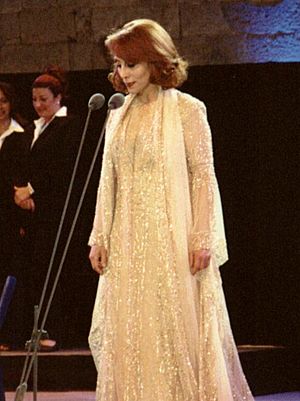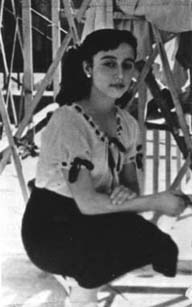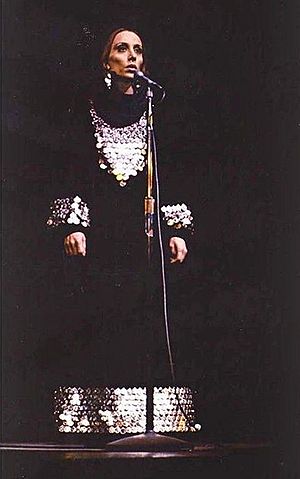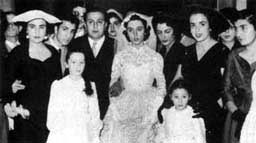Fairuz facts for kids
Quick facts for kids
Fairuz
|
|
|---|---|
| فيروز | |

Fairuz in 2001
|
|
| Born |
Nouhad Wadie Haddad
November 20, 1934 or November 21, 1935 Beirut, Lebanese Republic
|
| Occupation |
|
| Spouse(s) | |
| Children | 4, including Ziad |
| Family | see below |
| Musical career | |
| Genres |
|
| Instruments | Vocals |
| Years active | 1950–present |
| Labels | |
Nouhad Wadie Haddad, known as Fairuz, is a famous Lebanese singer. She is considered one of the most important singers in the history of the Arab world. People often call her "The Bird of the East," "The Cedar of Lebanon," "The Moon's Neighbor," and "The Voice of Lebanon."
Fairuz started her music journey as a teenager in the late 1940s. She sang in a choir at the national radio station in Lebanon. Her first big hit, "Itab," came out in 1952. This song instantly made her a star across the Arab world. In 1957, Fairuz performed live for the first time at the Baalbeck International Festival. There, she received the "Cavalier" honor, which is a top award for artists in Lebanon. Fairuz became famous throughout the Arab world in the 1950s and 1960s. This led her to perform in many Arab cities like Damascus, Amman, and Cairo.
Fairuz has received many awards and honors from different countries. These include Lebanon, Syria, Jordan, and France. She has performed in famous places around the world. Some of these are Albert Hall in London, Carnegie Hall in New York, and the Olympia in Paris.
Over more than sixty years, Fairuz has recorded almost 1500 songs. She has released over 80 albums and performed in 20 musicals. She has sold more than 150 million records worldwide. This makes her one of the best-selling Middle Eastern artists ever.
Contents
Early Life and Discovery
Nouhad Haddad was born in Beirut, Lebanon, in 1934 or 1935. Her family was Christian. Her father, Wadie, was from Mardin and worked in a print shop. Her mother, Lisa, was from a village in Mount Lebanon. The family lived in a small house in Beirut.
By age ten, Nouhad was known at school for her amazing singing voice. She often sang in school shows and on holidays. In February 1950, a famous musician named Mohammed Flayfel heard her. He was very impressed and told her to join the Lebanese Conservatory. At first, her father was unsure, but he agreed if her brother went with her.
Music Career Beginnings
Starting at the Radio
Mohammed Flayfel helped Nouhad a lot with her singing. She had an audition where Halim el Roumi, the head of the Lebanese radio station, heard her. He was amazed by her voice. He noticed she could sing in both Arabic and Western styles. Nouhad asked, and El Roumi hired her as a chorus singer at the radio station. He also gave her the stage name Fairuz, which means "turquoise" in Arabic.
Soon after, Fairuz met the Rahbani brothers, Assi and Mansour. They were also musicians at the radio station. They quickly became a great team. Assi started writing songs for Fairuz. One of these songs was "Itab," which became a huge hit. This song made Fairuz one of the most important Arab singers of her time.
Fairuz became famous during a special time for Arabic music. Her voice helped define Lebanese pop culture in the 20th century. She created music about many topics, from love to patriotism. Her songs often had a sad or thoughtful feeling. Her voice is described as clear and flexible, different from other Arab singers.
Becoming a Star in the 1950s
Fairuz's first big concert was in 1957 at the Baalbeck International Festival. She performed in the "Lebanese Nights" part of the festival. Fairuz and the Rahbani brothers became regular performers at this festival. Their shows started as small skits and grew into full musical plays. Fairuz became even more famous as she and other Arab artists sang about the Palestinian cause. They created many patriotic songs.
Changing Lebanese Music in the 1960s–1970s
Fairuz and the Rahbani brothers changed Lebanese music. They started adding Western sounds to their songs. Before them, Egyptian music was the main style, with long songs. The trio created shorter, three-minute songs in the Lebanese dialect that told a story. People loved this new style. Beirut was changing quickly, and many people wanted more modern music. Fairuz and the Rahbanis helped create a new Lebanese music identity. Their songs often talked about local and regional issues. By the 1960s, Fairuz was known as the "First Lady of Lebanese singing." The Rahbani brothers wrote hundreds of songs and many musical plays for her.
In 1971, Fairuz became famous worldwide after a big tour in North America. Her concerts received great reviews. Fairuz has performed in many countries. These include Syria, Jordan, Egypt, France, the United Kingdom, Canada, and the United States.
In 1972, Assi Rahbani became very ill. His son, Ziad Rahbani, who was 17, gave his mother a song. His uncle Mansour wrote new words for it, called "Saalouni n'Nass" ("The People Asked Me"). This song was about Fairuz performing without Assi for the first time. Assi later attended the first show of that musical, Al Mahatta.
In 1978, the trio toured Europe and the Persian Gulf. Assi's health got worse. He passed away in 1986. After his death, Fairuz started working mostly with her son, Ziad Rahbani, on her music.
During the Lebanese Civil War (1975–1990), Fairuz's fame grew even more. Unlike many other artists, she stayed in Lebanon. She did not hold concerts there, except for one musical play, Petra, performed in both parts of Beirut in 1978. Fairuz and the Rahbani brothers often sang against the war. They refused to pick sides, which made them loved by all Lebanese people. Fairuz became a symbol of unity and stability for Lebanon during a difficult time.
New Music in the 1980s
After working less with the Rahbani brothers in 1979, Fairuz continued with her son, Ziad Rahbani. Ziad helped Fairuz's music change. He moved away from the traditional folk style. Instead, he and Fairuz explored a more modern sound, including jazz and funk.
Fairuz appeared on French TV in 1988. She was the main guest on a show called Du côté de chez Fred. She was preparing for a concert in Paris. During the show, she received an award from the French Minister of Culture. Her first CD, The Very Best of Fairuz, came out in 1987. It included the famous song "Aatini al Nay wa ghanni," based on a poem by Khalil Gibran.
From the 1990s to Today
In the 1990s, Fairuz released six albums. She also held many big concerts. One important concert was in Beirut's Martyr's Square in 1994. This concert celebrated the rebuilding of the city center after the civil war. She also returned to the Baalbeck International Festival in 1998 after 25 years.
In 1992, Madonna used parts of Fairuz's songs without permission. They settled the issue, and Madonna's album was not allowed in Lebanon.
Fairuz performed in Las Vegas in 1999, with over 16,000 people attending. Since then, she has had many sold-out concerts. These include shows in Lebanon, Kuwait, Paris, and the United States.
Her first album of the new millennium, Wala Keef, was released in 2002.
On January 28, 2008, Fairuz performed at the Damascus Opera House in Syria. It was an emotional return after more than two decades. She played the main role in the musical Sah el-Nom. The BBC wrote that her voice is heard across Syria every day. Syrian historian Sami Moubayed said Syrians were thrilled. People of all ages came to the concert. Fairuz said she had never seen such an audience.
Fairuz's album Eh... Fi Amal was released on October 7, 2010. Her son Ziad Rahbani wrote all the songs. She also held two concerts in Beirut.
Fairuz released her album Bebalee on September 22, 2017. Her daughter, Rima Rahbani, released the first song from the album, "Lameen," in June 2017. This song was a tribute to Fairuz's late husband, Assi Rahbani.
On September 1, 2020, French president Emmanuel Macron visited Fairuz at her home in Lebanon. This visit happened after the big Beirut explosion.
Fairuz's Impact
For many years, radio stations in the Arab world have started their morning shows with a Fairuz song. Her songs were very popular during the Lebanese Civil War. People could hear her patriotic songs about peace and love. The Guardian newspaper said that Fairuz "essentially helped build the identity of Lebanon." Fairuz is highly respected in Lebanese culture. She is a symbol of unity in a region with many disagreements.
In 1997, Billboard magazine called her "the supreme Diva of Lebanon." In 1999, The New York Times described her as "a living icon without equal." They said her rise as a singer happened as Lebanon became a lively cultural center.
In 2008, the BBC called her "the legendary Lebanese singer and greatest living Arab diva." The Independent newspaper said that all young female singers in the region seem to be inspired by her.
Fairuz has received many awards. These include the Key to the Holy City (1973), the Jordanian Medal of Honor (1975), and the Jerusalem Award. She was also made a Commander of Arts and Letters by French president François Mitterrand in 1988. In 1998, French president Jacques Chirac made her a Knight of the Legion of Honor.
Performances and Public Image
Fairuz has performed in many countries around the world. These include Syria, Jordan, Egypt, France, the United Kingdom, Canada, and the United States.
During her performances, Fairuz is known for being very calm and still. She says she sings as if she is praying. She is also described as being very private and modest, like a mother. She represents the Lebanese woman at home.
Personal Life
Not much is known about Fairuz's private life. She keeps her personal life separate from her public image as Fairuz.
Fairuz was born into a Christian family. She became Greek Orthodox when she married Assi Rahbani (1923–1986) on January 23, 1955. Assi was one of the Rahbani brothers who helped her singing career. They had four children: Ziad (born 1956), who is a composer and pianist; Hali (born 1958), who became paralyzed as a child; Layal (born 1960, died in 1988), also a composer; and Rima (born 1965), a photographer and film director.
Theatrical Works
Most of the works by Fairuz and the Rahbani brothers were musical plays. The Rahbani Brothers created 25 popular musical plays over 30 years. They are known for creating world-class Arabic musical theater.
These musicals combined stories, songs, and dialogue. The music varied from Lebanese folk styles to classical and Western sounds. Fairuz played the main roles in these plays. Other singers and actors also performed with her.
The Rahbani plays often showed patriotism, love, and a longing for village life. They also included comedy, drama, and ideas about life and politics. The songs Fairuz sang in these plays became very popular among Lebanese and Arabs worldwide.
Here are some of the musicals Fairuz performed in:
- Ayyam al Hassad (Days of Harvest – 1957)
- Al 'Urs fi l’Qarya (The Wedding in the Village – 1959)
- Al Ba'albakiya (The Girl from Baalbek – 1961)
- Jisr el Amar (Bridge of the Moon – 1962)
- Al Layl wal Qandil (The Night and the Lantern – 1963)
- Biyya'el Khawatem (Ring Salesman – 1964)
- Ayyam Fakhreddine (The Days of Fakhreddine – 1966)
- Hala wal Malik (Hala and the King – 1967)
- Ach Chakhs (The Person – 1968–1969)
- Jibal Al Sawwan (Sawwan Mountains – 1969)
- Ya'ich Ya'ich (Long Live, Long Live – 1970)
- Sah Ennawm (Did you sleep well? – 1970–1971 – 2006–2008)
- Nass min Wara' (People Made out of Paper – 1971–1972)
- Natourit al Mafatih (The Guardian of the Keys – 1972)
- Al Mahatta (The Station – 1973)
- Loulou – 1974
- Mais el Reem (The Deer's Meadow – 1975)
- Petra – 1977–1978
Most of these musical plays were recorded. Eighteen of them have been released on audio CD, and two on DVD.
Film and TV Appearances
Movies
| Year | Title (English translation) |
Role |
|---|---|---|
| 1964 | Biya' Al Khawatem (The Rings Salesman) |
Rima |
| 1967 | Safar Barlik (Mobilization) |
Adla |
| 1968 | Bint Al Haress (The Guard's Daughter) |
Najma |
Television Shows
Fairuz also appeared in these Lebanese television programs:
- Al Iswara (The Bracelet)
- Day'it El Aghani (Village of Songs)
- Layali As'Saad (Nights of Happiness)
- Al Quds fil Bal (Jerusalem in my Mind)
- Dafater El Layl (Night Memoirs)
- Maa Al Hikayat (With Stories)
- Sahret Hobb (Romantic Evening)
- Qasidat Hobb (A Love Poem)
Discography
Fairuz has a very large collection of music. She is said to have between 1,500 and 3,000 songs.
About 85 Fairuz CDs, vinyl records, and cassettes have been officially released. Most of these songs were written by the Rahbani brothers. Other composers like Philemon Wehbe and Ziad Rahbani also contributed.
Many of Fairuz's songs from the 1950s and 1960s have not been released. There are also unreleased songs by other composers.
Fairuz also released a live album called Lebanon: The Baalbek Folk Festival in 1994.
See also
 In Spanish: Fairuz para niños
In Spanish: Fairuz para niños
- Rahbani brothers
- Wadih El Safi
- Ziad Rahbani
 | Charles R. Drew |
 | Benjamin Banneker |
 | Jane C. Wright |
 | Roger Arliner Young |




